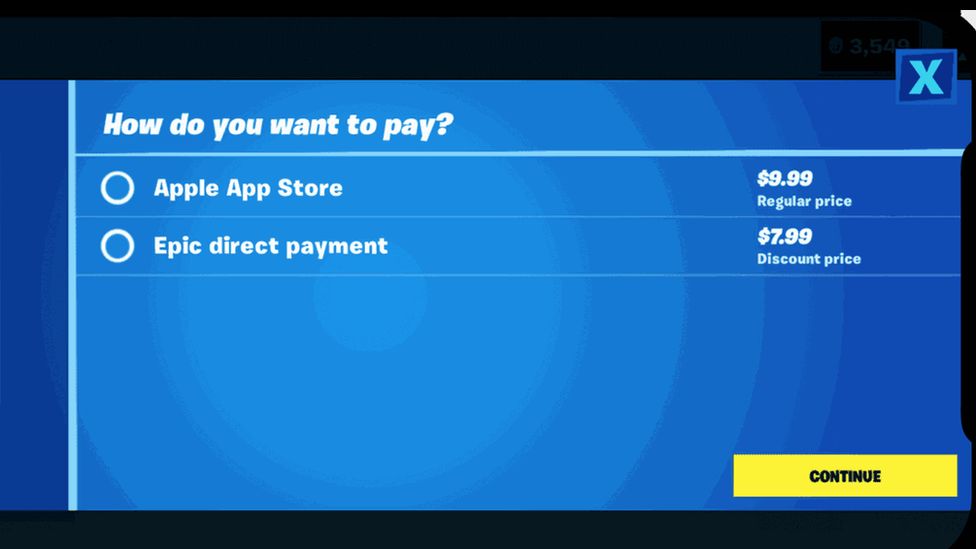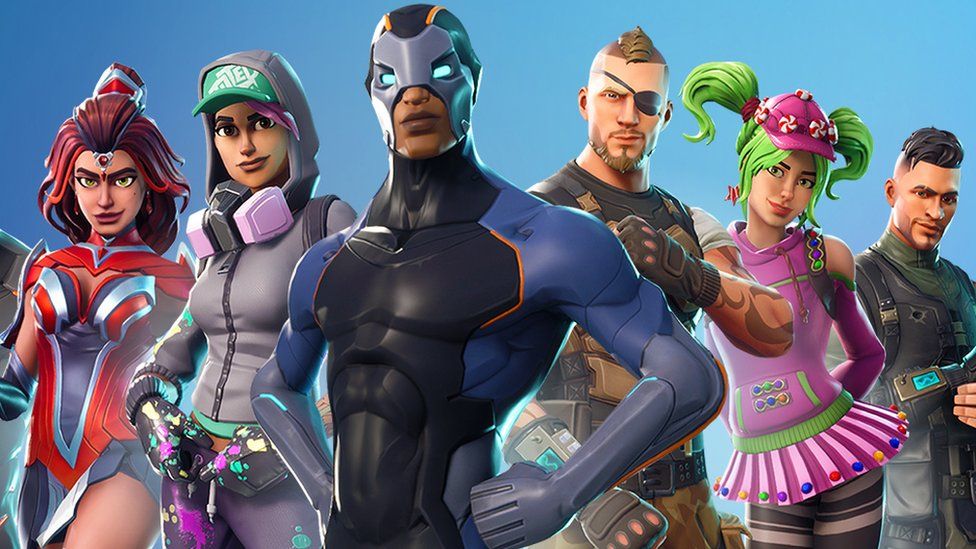After months of hype and warring words, Epic Games is finally getting its day in court with Apple.
The trial began on Monday - and is one of the most important in Apple's history.
Apple boss Tim Cook will be giving evidence, the first time he's given testimony at a trial.
At stake is the future of the App Store and the amount it charges developers - a wildly lucrative money spinner for the company.
The trial got off to a slightly chaotic start. The public hearing failed at first to mute those who were listening in via phone call, meaning calls from fans for the return of Fortnite to mobiles were accidentally broadcast.
The storm began in August last year, when Epic Games laid a trap for Apple.
Its hit game Fortnite implemented its own in-app payment - bypassing Apple's 30% charges.
Apple promptly kicked Epic Games off the App Store.
But Epic Games was waiting for just that.
It slapped Apple with a 65-page lawsuit - and had even prepared a high production video, a spoof of Apple's iconic 1984 advert for the Apple Mac.
Epic Games has for years claimed the charges imposed on it by Apple are extortionate.
Their argument is simple: that Apple's control over the App Store is anti-competitive.
It believes that developers should be able to make apps for smartphones without having to pay large sums to Apple (and to Google for Google Play purchases).
Spotify, Match and Tile are just a few of the many companies that have also claimed Apple's charges are unfair.
Apple is estimated to have made hundreds of millions of dollars from Fortnite alone in charges.
Epic Games' big argument is: if they don't want to pay, then where else do they go to sell their products?

Apple's App Store and Google's Google Play are the dominant global app stores, outside China.
Epic Games has tried to sell Fortnite away from these two stores. It tried to "sideload" the app on Android phones - to try and avoid Google's own 30% charge. However, not enough people downloaded it away from Google Play.
Epic Games' reluctant conclusion: if you want to make games for smartphones you have to be on either the App Store or Google Play.
'Apple Tax'
But unwilling to lie down and accept the charges - which it calls an "Apple Tax" - Epic Games decided to sue Apple instead.
Worryingly for Apple, many of its App Store critics come from across the political divide.
In a Senate hearing two weeks ago, Apple's Chief Compliance Officer Kyle Andeer was grilled by lawmakers. Politicians of all stripes - usually so divided on policy - were united in their attacks on Apple.
Democrats Amy Klobuchar and Richard Blumenthal and Republicans Mike Lee and Josh Hawley all took up similar lines of questioning.
Senator Klobuchar said that Apple's App Store was a "literal monopoly".

And on Friday the European Union announced that it was charging Apple for its behaviour on the App Store.
Epic Games has timed the lawsuit perfectly.
The key question the judge will have to answer is whether Apple's App Store is an "essential facility", a sort of public utility that no one company should control.
Matt Stoller, an anti-monopoly campaigner, believes so.
"Everybody knows that Apple is in charge of what should be public rights of way. It would be easiest if the judge just rules in favour of Epic [Games], that would fix it," he says.
Apple can afford good lawyers though. So what's Apple's defence?
Firstly, Apple says it invented the App Store and as a private company it can charge what it wants.
It also says the 30% charge to developers is the industry standard for gaming, and competes not just with Google Play but with Microsoft, Steam, PlayStation, Xbox and Nintendo.
'Hand wavy'
Influential tech blogger John Gruber says Apple has a point.
"In terms of the actual split, 70/30 is pretty standard across the board. One of the things that really stands out about Epic Games' argument is that they have no complaint whatsoever. It's all very hand wavy, and very much a PR argument, not a legal one."
Apple also says that its payment system is fair to smaller developers. It says 83% of apps and 76% of games on the App Store are free - developers pay no commission.
And they say that although their top rate charge is 30%, most developers pay no more than 15% in charges.
Apple argues it also oversees an App Store vetting process, making sure the Apple ecosystem isn't compromised by dodgy apps. That costs money.
However it's thought the amount that Apple spends on this process is a tiny fraction of the amount it receives from developers. Critics like Matt Stoller also question how effective Apple's vetting procedures are.
"There are all sorts of apps that have scams that Apple doesn't catch. So their arguments about safety and security are sort of nonsense," he says.
'The risk is high'
So what are Apple's chances? John Gruber thinks they're good.
"I do think that on legal grounds, Apple is in a very good position. But the risk is very high because [if they lost] it would disrupt the whole business model of the app store".
Matt Stoller says that antitrust cases are notoriously hard to predict.
"Antitrust law, as it's practiced in the US, is a complete mess. So we have no idea. The law basically depends on what the judge had for breakfast."
The trial is expected to conclude in the last week of May. However, even if Apple wins, the fight over how Apple runs its App Store will rage on.
James Clayton is the BBC's North America technology reporter based in San Francisco. Follow him on Twitter @jamesclayton5.
"in" - Google News
May 03, 2021 at 06:03AM
https://ift.tt/3vtuiOS
Apple faces Epic Games in court - BBC News
"in" - Google News
https://ift.tt/2MLa3Y1
https://ift.tt/2YrnuUx
Bagikan Berita Ini














0 Response to "Apple faces Epic Games in court - BBC News"
Post a Comment